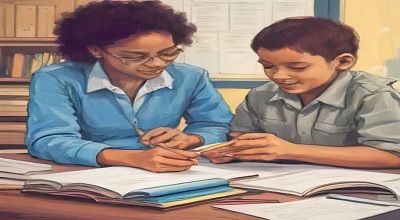Pedagogy
Pedagogy is the discipline and practice of teaching, encompassing the strategies, methods, and principles used in education to facilitate learning. It’s concerned with how to best engage students, convey information, and create a supportive and effective learning environment. Effective pedagogy is vital for the success of students and their development.
Here’s how to use pedagogy in school:
- Understanding the Learning Process: Effective pedagogy starts with understanding how students learn. This includes their cognitive development, learning styles, and individual needs. Teachers need to be aware of the diverse backgrounds and abilities of their students.
- Set Clear Learning Objectives: Before designing a lesson or curriculum, it’s essential to establish clear learning objectives. What do you want your students to achieve or understand by the end of the lesson or course?
- Design Curriculum and Lesson Plans: Pedagogy involves designing curriculum and lesson plans that align with the learning objectives. This includes selecting appropriate content, resources, and activities.
- Active Learning Strategies: Incorporate active learning strategies, where students are actively engaged in the learning process. These can include group discussions, problem-solving activities, debates, experiments, and hands-on projects.
- Differentiation: Recognize that students have different learning needs and abilities. Use differentiated instruction to tailor your teaching to individual or small groups of students to meet their specific needs.
- Assessment: Develop assessment methods to measure student learning and understanding. This can include quizzes, tests, projects, presentations, and peer evaluations.
- Feedback: Provide timely and constructive feedback to students, helping them understand their strengths and weaknesses, and guiding them on how to improve.
More Read…
- Technology Integration: Leverage educational technology to enhance the learning experience. This might involve using educational apps, online resources, or interactive multimedia tools.
- Reflective Practice: Continually evaluate and reflect on your teaching methods and their effectiveness. Make adjustments as needed based on student performance and feedback.
- Collaboration and Professional Development: Collaborate with colleagues, attend professional development workshops, and stay up-to-date with the latest educational research and trends. This can help you refine your pedagogical approach.
- Student-Centered Approach: Promote a student-centered approach where students have some control over their learning, make choices, and are encouraged to be active participants.
- Classroom Management: Establish effective classroom management techniques to create a positive and conducive learning environment.
- Cultural Sensitivity: Be aware of and sensitive to the cultural and social backgrounds of your students. Cultural competency is important for inclusive pedagogy.
- Inclusion: Ensure that your pedagogy is inclusive and accommodates students with diverse abilities, backgrounds, and needs. This may involve providing additional support or resources.
- Feedback from Students: Encourage students to provide feedback on your teaching methods. This can help you refine your pedagogy and make necessary improvements.
Summary
Effective pedagogy is not a one-size-fits-all approach; it should be adaptable to the specific needs and circumstances of the students you’re working with. It’s an ongoing process of learning, adapting, and improving to create the best possible educational experience for your students.
